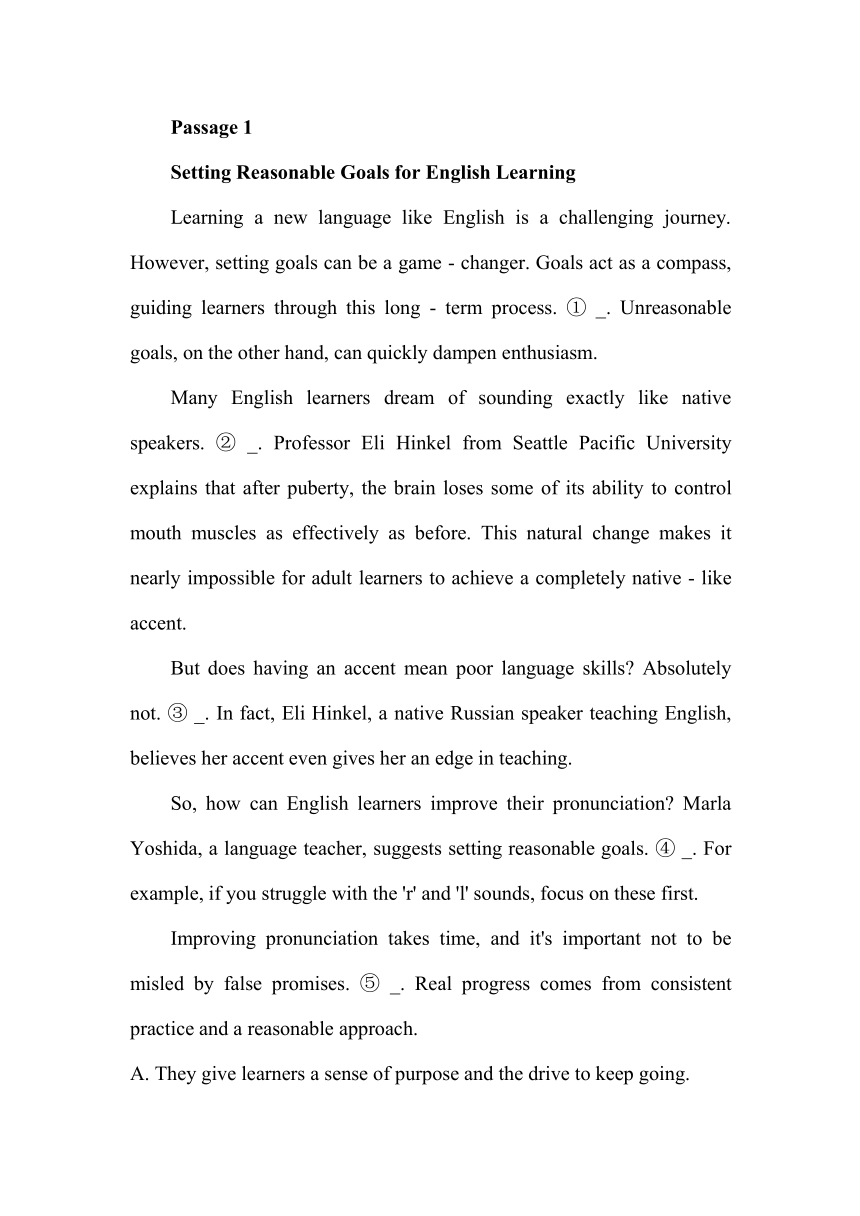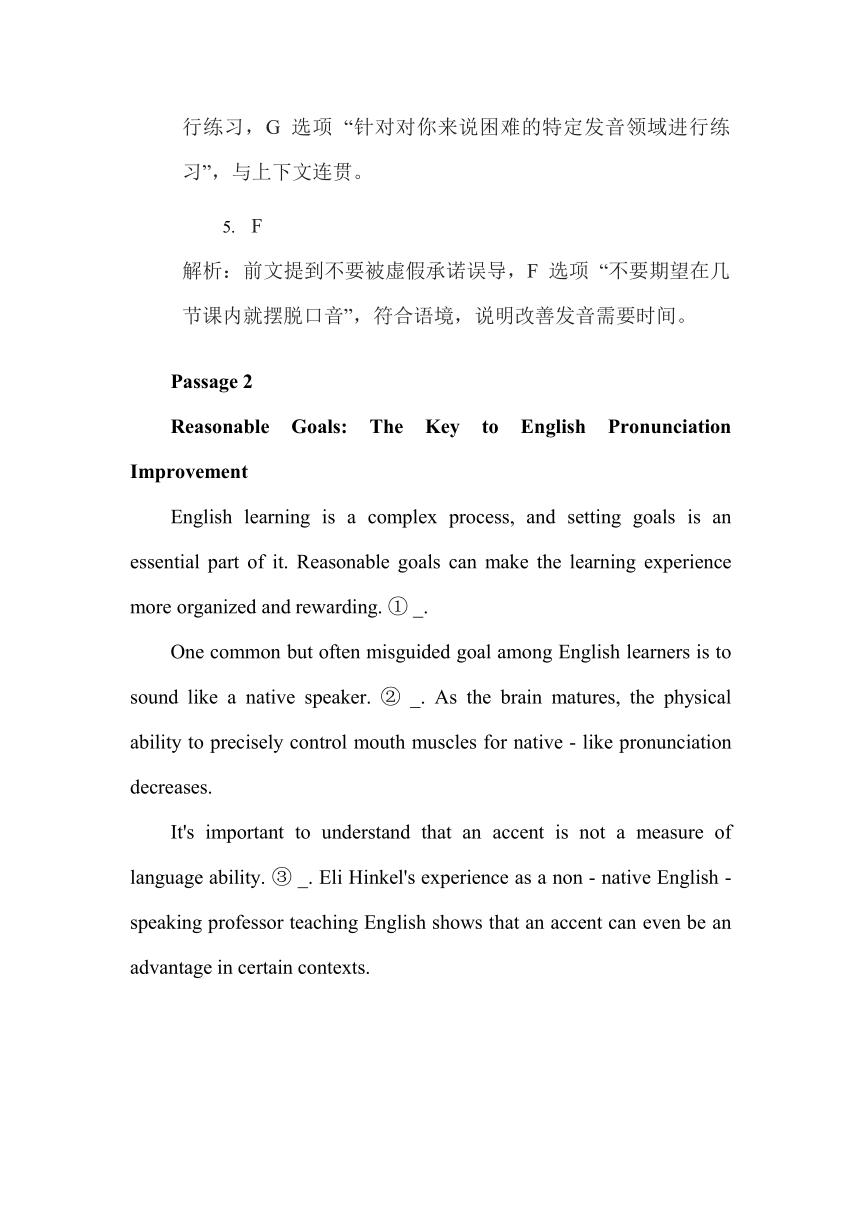2025届高三英语一轮复习:VOA话题设置合理的学习目标七选五专项训练(含答案)
文档属性
| 名称 | 2025届高三英语一轮复习:VOA话题设置合理的学习目标七选五专项训练(含答案) |  | |
| 格式 | docx | ||
| 文件大小 | 20.5KB | ||
| 资源类型 | 教案 | ||
| 版本资源 | 人教版(2019) | ||
| 科目 | 英语 | ||
| 更新时间 | 2025-01-10 16:18:07 | ||
图片预览




文档简介
Passage 1
Setting Reasonable Goals for English Learning
Learning a new language like English is a challenging journey. However, setting goals can be a game - changer. Goals act as a compass, guiding learners through this long - term process. ① _. Unreasonable goals, on the other hand, can quickly dampen enthusiasm.
Many English learners dream of sounding exactly like native speakers. ② _. Professor Eli Hinkel from Seattle Pacific University explains that after puberty, the brain loses some of its ability to control mouth muscles as effectively as before. This natural change makes it nearly impossible for adult learners to achieve a completely native - like accent.
But does having an accent mean poor language skills Absolutely not. ③ _. In fact, Eli Hinkel, a native Russian speaker teaching English, believes her accent even gives her an edge in teaching.
So, how can English learners improve their pronunciation Marla Yoshida, a language teacher, suggests setting reasonable goals. ④ _. For example, if you struggle with the 'r' and 'l' sounds, focus on these first.
Improving pronunciation takes time, and it's important not to be misled by false promises. ⑤ _. Real progress comes from consistent practice and a reasonable approach.
A. They give learners a sense of purpose and the drive to keep going.
B. You should try to imitate native speakers as closely as possible.
C. There is no direct correlation between accent and language proficiency.
D. It's an achievable goal if you practice hard enough.
E. This is often an unrealistic goal for many learners.
F. Don't expect to get rid of your accent in a few quick lessons.
G. Work on specific areas of pronunciation that are difficult for you.
答案
A
解析:前文提到目标像指南针引导学习者,A 选项 “它们给学习者一种目标感和继续前进的动力”,进一步阐述目标的作用,与前文衔接紧密,符合段落主旨。
E
解析:前文说很多学习者梦想发音像母语者,后文解释这种目标对成人学习者几乎不可能,E 选项 “这对很多学习者来说通常是一个不切实际的目标”,起到承上启下的作用。
C
解析:此段讨论口音和语言技能的关系,C 选项 “口音和语言熟练程度之间没有直接关联”,符合段落主旨。
G
解析:前文说要设定合理目标,后文举例针对发音困难的音进行练习,G 选项 “针对对你来说困难的特定发音领域进行练习”,与上下文连贯。
F
解析:前文提到不要被虚假承诺误导,F 选项 “不要期望在几节课内就摆脱口音”,符合语境,说明改善发音需要时间。
Passage 2
Reasonable Goals: The Key to English Pronunciation Improvement
English learning is a complex process, and setting goals is an essential part of it. Reasonable goals can make the learning experience more organized and rewarding. ① _.
One common but often misguided goal among English learners is to sound like a native speaker. ② _. As the brain matures, the physical ability to precisely control mouth muscles for native - like pronunciation decreases.
It's important to understand that an accent is not a measure of language ability. ③ _. Eli Hinkel's experience as a non - native English - speaking professor teaching English shows that an accent can even be an advantage in certain contexts.
To improve pronunciation, Marla Yoshida recommends a practical approach. ④ _. Start with the sounds that cause you the most trouble and gradually work your way through others.
Finally, be patient with yourself. ⑤ _. There are no shortcuts, and consistent effort is the key to making real progress.
A. They help learners break down the learning process into manageable steps.
B. You should focus on grammar first, and pronunciation will follow.
C. This goal is not easily achievable for most adult learners.
D. Having an accent has nothing to do with how well you know the language.
E. You can master pronunciation quickly if you use the right methods.
F. Set specific, achievable goals related to your pronunciation difficulties.
G. Pronunciation improvement is a slow and steady process.
答案
A
解析:前文强调设定目标对英语学习的重要性,A 选项 “它们帮助学习者将学习过程分解为可管理的步骤”,具体说明合理目标的好处,与前文衔接紧密。
C
解析:前文指出很多学习者想发音像母语者这个目标,后文说明大脑成熟后难以实现,C 选项 “这个目标对大多数成年学习者来说不容易实现”,承上启下。
D
解析:此段围绕口音和语言能力的关系,D 选项 “有口音与你对语言的掌握程度无关”,符合段落主题。
F
解析:前文说 Marla Yoshida 推荐实用方法,后文提到从困难发音开始,F 选项 “设定与你的发音困难相关的具体、可实现的目标”,与上下文连贯。
G
解析:前文提到要对自己有耐心,G 选项 “发音改善是一个缓慢而稳定的过程”,符合语境,强调发音改善需要时间。
Passage 3
Achieving Good English Pronunciation with Reasonable Goals
Embarking on the journey of learning English, setting goals is fundamental. Goals provide direction and motivation throughout this arduous process. ① _.
A significant number of English learners aim to lose their accents and sound like native speakers. ② _. According to Eli Hinkel, after reaching a certain age, the brain's plasticity regarding mouth - muscle control changes, making it extremely difficult to achieve a native - like accent.
However, an accent should not be regarded as a sign of weak language skills. ③ _. Eli Hinkel herself has found that her accent can be beneficial in her teaching career.
Marla Yoshida offers valuable advice on improving pronunciation. ④ _. For instance, identify the specific sounds that are causing problems and work on them systematically.
In conclusion, improving pronunciation is a long - term commitment. ⑤ _. Avoid being deceived by claims of quick - fix solutions.
A. They keep learners focused and determined to overcome difficulties.
B. You don't need to worry about your accent at all.
C. This goal is rather unrealistic for many adult English learners.
D. There is no connection between the two, and an accent can have its merits.
E. You should practice speaking English as much as you can.
F. Set reasonable goals based on your own pronunciation challenges.
G. It requires consistent practice and a realistic attitude.
答案
A
解析:前文说设定目标对英语学习很重要,A 选项 “它们让学习者专注并决心克服困难”,进一步阐述目标的作用,与前文逻辑连贯。
C
解析:前文提到学习者想摆脱口音像母语者,后文解释因大脑变化难以实现,C 选项 “这个目标对很多成年英语学习者来说相当不现实”,起到承上启下作用。
D
解析:此段讨论口音和语言技能关系,D 选项 “两者之间没有联系,而且口音也有它的优点”,符合段落主旨。
F
解析:前文说 Marla Yoshida 提供建议,后文举例针对发音问题设定目标,F 选项 “根据你自己的发音挑战设定合理目标”,与上下文相符。
G
解析:前文说改善发音是长期的事,G 选项 “它需要持续练习和现实的态度”,符合语境,强调改善发音的要求。
Setting Reasonable Goals for English Learning
Learning a new language like English is a challenging journey. However, setting goals can be a game - changer. Goals act as a compass, guiding learners through this long - term process. ① _. Unreasonable goals, on the other hand, can quickly dampen enthusiasm.
Many English learners dream of sounding exactly like native speakers. ② _. Professor Eli Hinkel from Seattle Pacific University explains that after puberty, the brain loses some of its ability to control mouth muscles as effectively as before. This natural change makes it nearly impossible for adult learners to achieve a completely native - like accent.
But does having an accent mean poor language skills Absolutely not. ③ _. In fact, Eli Hinkel, a native Russian speaker teaching English, believes her accent even gives her an edge in teaching.
So, how can English learners improve their pronunciation Marla Yoshida, a language teacher, suggests setting reasonable goals. ④ _. For example, if you struggle with the 'r' and 'l' sounds, focus on these first.
Improving pronunciation takes time, and it's important not to be misled by false promises. ⑤ _. Real progress comes from consistent practice and a reasonable approach.
A. They give learners a sense of purpose and the drive to keep going.
B. You should try to imitate native speakers as closely as possible.
C. There is no direct correlation between accent and language proficiency.
D. It's an achievable goal if you practice hard enough.
E. This is often an unrealistic goal for many learners.
F. Don't expect to get rid of your accent in a few quick lessons.
G. Work on specific areas of pronunciation that are difficult for you.
答案
A
解析:前文提到目标像指南针引导学习者,A 选项 “它们给学习者一种目标感和继续前进的动力”,进一步阐述目标的作用,与前文衔接紧密,符合段落主旨。
E
解析:前文说很多学习者梦想发音像母语者,后文解释这种目标对成人学习者几乎不可能,E 选项 “这对很多学习者来说通常是一个不切实际的目标”,起到承上启下的作用。
C
解析:此段讨论口音和语言技能的关系,C 选项 “口音和语言熟练程度之间没有直接关联”,符合段落主旨。
G
解析:前文说要设定合理目标,后文举例针对发音困难的音进行练习,G 选项 “针对对你来说困难的特定发音领域进行练习”,与上下文连贯。
F
解析:前文提到不要被虚假承诺误导,F 选项 “不要期望在几节课内就摆脱口音”,符合语境,说明改善发音需要时间。
Passage 2
Reasonable Goals: The Key to English Pronunciation Improvement
English learning is a complex process, and setting goals is an essential part of it. Reasonable goals can make the learning experience more organized and rewarding. ① _.
One common but often misguided goal among English learners is to sound like a native speaker. ② _. As the brain matures, the physical ability to precisely control mouth muscles for native - like pronunciation decreases.
It's important to understand that an accent is not a measure of language ability. ③ _. Eli Hinkel's experience as a non - native English - speaking professor teaching English shows that an accent can even be an advantage in certain contexts.
To improve pronunciation, Marla Yoshida recommends a practical approach. ④ _. Start with the sounds that cause you the most trouble and gradually work your way through others.
Finally, be patient with yourself. ⑤ _. There are no shortcuts, and consistent effort is the key to making real progress.
A. They help learners break down the learning process into manageable steps.
B. You should focus on grammar first, and pronunciation will follow.
C. This goal is not easily achievable for most adult learners.
D. Having an accent has nothing to do with how well you know the language.
E. You can master pronunciation quickly if you use the right methods.
F. Set specific, achievable goals related to your pronunciation difficulties.
G. Pronunciation improvement is a slow and steady process.
答案
A
解析:前文强调设定目标对英语学习的重要性,A 选项 “它们帮助学习者将学习过程分解为可管理的步骤”,具体说明合理目标的好处,与前文衔接紧密。
C
解析:前文指出很多学习者想发音像母语者这个目标,后文说明大脑成熟后难以实现,C 选项 “这个目标对大多数成年学习者来说不容易实现”,承上启下。
D
解析:此段围绕口音和语言能力的关系,D 选项 “有口音与你对语言的掌握程度无关”,符合段落主题。
F
解析:前文说 Marla Yoshida 推荐实用方法,后文提到从困难发音开始,F 选项 “设定与你的发音困难相关的具体、可实现的目标”,与上下文连贯。
G
解析:前文提到要对自己有耐心,G 选项 “发音改善是一个缓慢而稳定的过程”,符合语境,强调发音改善需要时间。
Passage 3
Achieving Good English Pronunciation with Reasonable Goals
Embarking on the journey of learning English, setting goals is fundamental. Goals provide direction and motivation throughout this arduous process. ① _.
A significant number of English learners aim to lose their accents and sound like native speakers. ② _. According to Eli Hinkel, after reaching a certain age, the brain's plasticity regarding mouth - muscle control changes, making it extremely difficult to achieve a native - like accent.
However, an accent should not be regarded as a sign of weak language skills. ③ _. Eli Hinkel herself has found that her accent can be beneficial in her teaching career.
Marla Yoshida offers valuable advice on improving pronunciation. ④ _. For instance, identify the specific sounds that are causing problems and work on them systematically.
In conclusion, improving pronunciation is a long - term commitment. ⑤ _. Avoid being deceived by claims of quick - fix solutions.
A. They keep learners focused and determined to overcome difficulties.
B. You don't need to worry about your accent at all.
C. This goal is rather unrealistic for many adult English learners.
D. There is no connection between the two, and an accent can have its merits.
E. You should practice speaking English as much as you can.
F. Set reasonable goals based on your own pronunciation challenges.
G. It requires consistent practice and a realistic attitude.
答案
A
解析:前文说设定目标对英语学习很重要,A 选项 “它们让学习者专注并决心克服困难”,进一步阐述目标的作用,与前文逻辑连贯。
C
解析:前文提到学习者想摆脱口音像母语者,后文解释因大脑变化难以实现,C 选项 “这个目标对很多成年英语学习者来说相当不现实”,起到承上启下作用。
D
解析:此段讨论口音和语言技能关系,D 选项 “两者之间没有联系,而且口音也有它的优点”,符合段落主旨。
F
解析:前文说 Marla Yoshida 提供建议,后文举例针对发音问题设定目标,F 选项 “根据你自己的发音挑战设定合理目标”,与上下文相符。
G
解析:前文说改善发音是长期的事,G 选项 “它需要持续练习和现实的态度”,符合语境,强调改善发音的要求。
